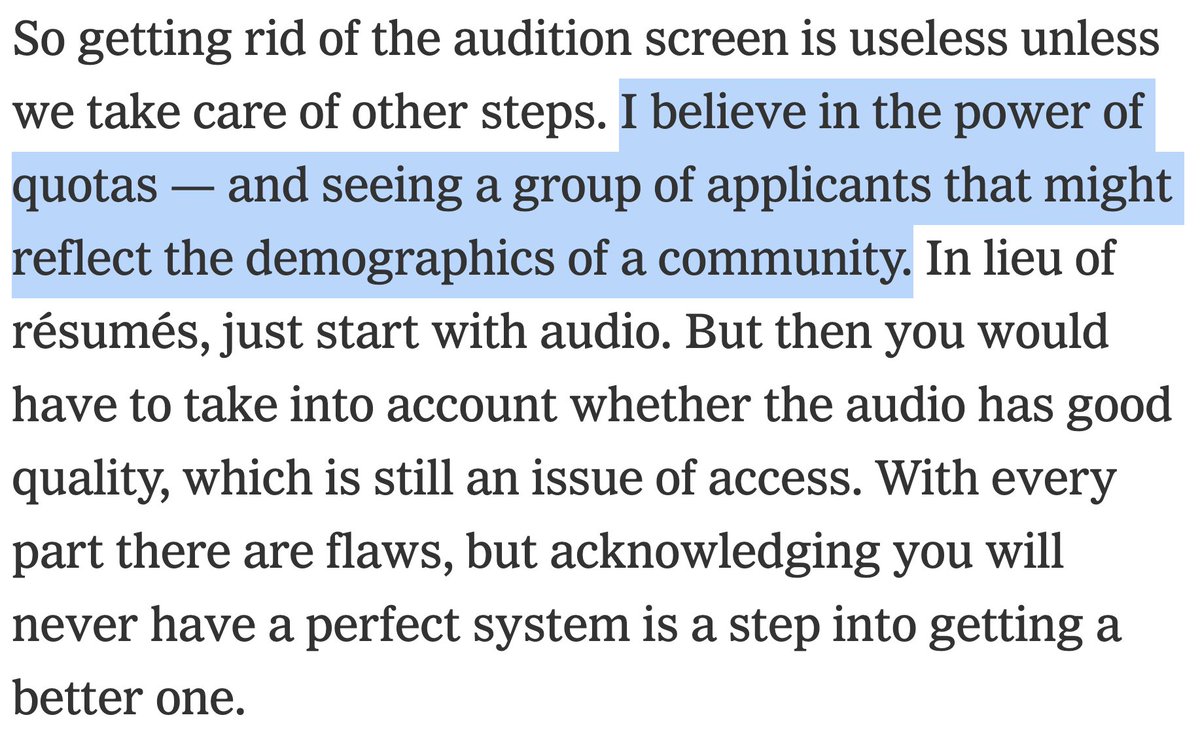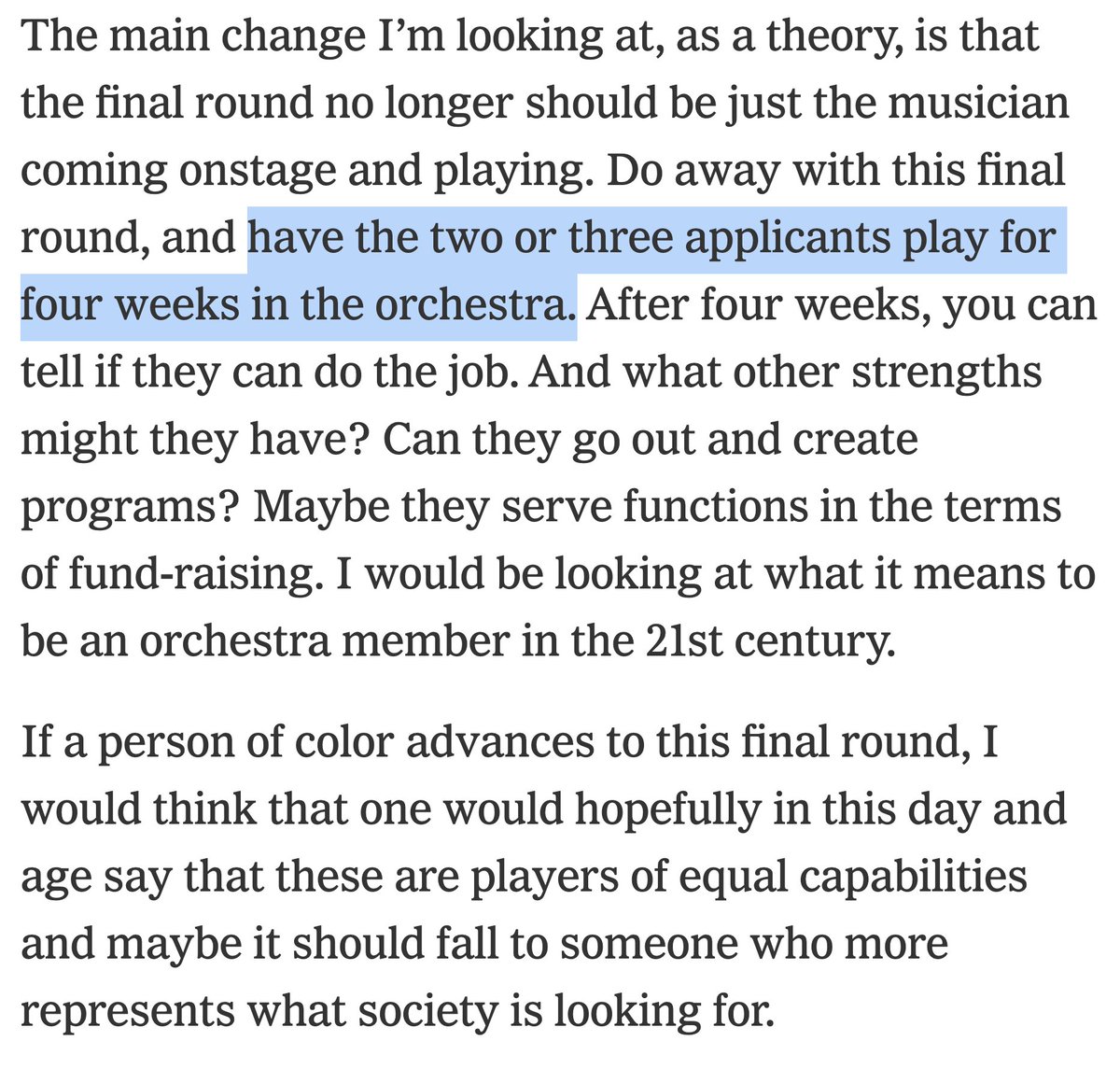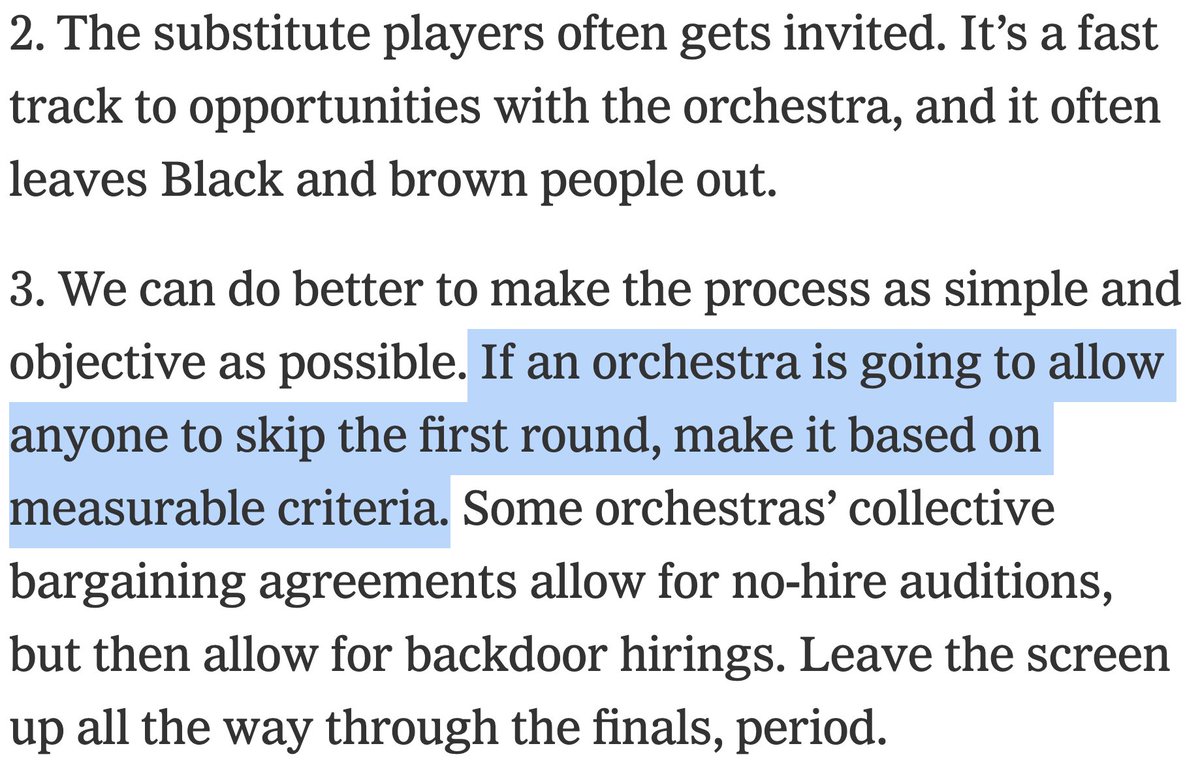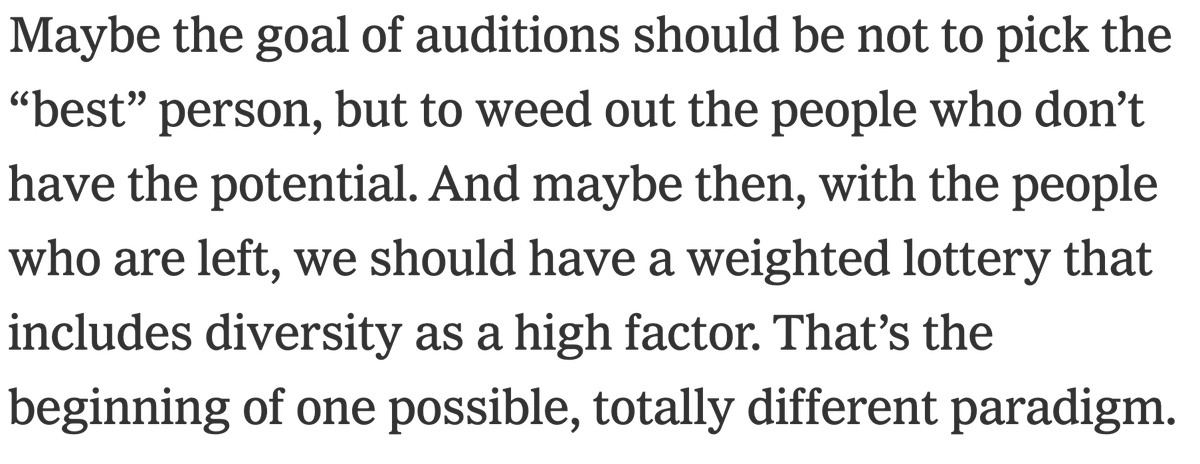Very late to this, but I wanted to break down the @nytimesarts article on how to diversify orchestras via the audition process, who they interview, and what they say.
Some great ideas and some infuriating opinions follow
/thread
https://www.nytimes.com/2020/09/10/arts/music/diversity-orchestra-auditions.html
Some great ideas and some infuriating opinions follow
/thread
https://www.nytimes.com/2020/09/10/arts/music/diversity-orchestra-auditions.html
[context] The piece is a response to @TommasiniNYT's essay proposing that orchestras abolish blind auditions and weight based on who is playing. Based on what I saw in my networks, people thought this was a poor solution. https://www.nytimes.com/2020/07/16/arts/music/blind-auditions-orchestras-race.html?action=click&module=RelatedLinks&pgtype=Article
LINA GONZÁLEZ-GRANADOS, conductor
@Linitaconductor brings up diversity quotas, a big theme among many of the candidates' answers. Love her idea of screening initial candidates with audio-only, anonymously (instead of resumes, which invite bias).
@Linitaconductor brings up diversity quotas, a big theme among many of the candidates' answers. Love her idea of screening initial candidates with audio-only, anonymously (instead of resumes, which invite bias).
LEONARD SLATKIN, conductor
I disagree with his main suggestion: subbing out final orchestra rounds for trial months.
This often forgets that tenured orch members can be shitty and veto you for reasons like "attitude", which are often racialized. (cont)
I disagree with his main suggestion: subbing out final orchestra rounds for trial months.
This often forgets that tenured orch members can be shitty and veto you for reasons like "attitude", which are often racialized. (cont)
Something I liked was the idea that you should weight other ways members can contribute (many of the interviewers make this point)
Finally, he says that when presented with multiple candidates who can do the job, the diverse candidate should get the nod.
Finally, he says that when presented with multiple candidates who can do the job, the diverse candidate should get the nod.
MAX RAIMI, violist
ugh.
framing his argument generously, it's:
• minorities are already low % in schools
• if we use a % I just made up, we'd only have 5 more ppl of color in the CSO
• therefore we would have to sacrifice quality for diversity, which is unacceptable
ugh.
framing his argument generously, it's:
• minorities are already low % in schools
• if we use a % I just made up, we'd only have 5 more ppl of color in the CSO
• therefore we would have to sacrifice quality for diversity, which is unacceptable
Raimi's take is such a trash way of thinking about diversity, and can be seen as an extension of the lazy "minorities don't even like classical music" trope.
Personally, if orchestras were 15% "worse" but 40% more diverse, they would serve the public so much better
Personally, if orchestras were 15% "worse" but 40% more diverse, they would serve the public so much better
WESTON SPROTT, ALEX LAING, JOY PAYTON-STEVENS and TITUS UNDERWOOD, orchestral musicians
They raise so many great points. The key one?
* * * Auditions are never 100% blind!!!!! * * *
Trials, invite-only auditions, unscreened final rounds... they add subjectivity
They raise so many great points. The key one?
* * * Auditions are never 100% blind!!!!! * * *
Trials, invite-only auditions, unscreened final rounds... they add subjectivity
Their proposed solution is similar to LS's above: value more stuff than just quality of playing orchestral excerpts.
An orchestra's potential value add to both society AND the music field is much greater than just pure musicianship.
An orchestra's potential value add to both society AND the music field is much greater than just pure musicianship.
@AubreyBergauer, administrator/orch consultant
Was v interested in her perspective b/c of her results diversifying the @CAsymphony.
She calls out two arbitrary practices of orchestras I hadn't thought about:
• Who gets to be a sub
• Who gets to skip the first round
(cont)
Was v interested in her perspective b/c of her results diversifying the @CAsymphony.
She calls out two arbitrary practices of orchestras I hadn't thought about:
• Who gets to be a sub
• Who gets to skip the first round
(cont)
Finally, as AB notes - start by asking the people discrimination affects, and centralize their opinions and perspectives!!!!
@afadworkin and @mcgillab, leader of @SphinxOrg and sole black musician in the NYPHIL, respectively
They had concrete numbers:
• We gotta measure how many Black and Latinx artists are auditioning
• Orchestras shd commit 15% of their budget to addressing racism
(cont)
They had concrete numbers:
• We gotta measure how many Black and Latinx artists are auditioning
• Orchestras shd commit 15% of their budget to addressing racism
(cont)
• Play more music by Black and Latinx composers!! They call for 15% over the next decade
• They specifically call for floor of 25% minority representation at auditions
• They specifically call for floor of 25% minority representation at auditions
ED YIM, pres of @AmerCompOrch
Calls out the "culture fit" bs that plagues American hiring managers as often as orchestras.
Also proposes a system where applicants who fit a minimum standard are entered into a lottery, weighted by diversity.
(meh for me, but keep swingin'!!)
Calls out the "culture fit" bs that plagues American hiring managers as often as orchestras.
Also proposes a system where applicants who fit a minimum standard are entered into a lottery, weighted by diversity.
(meh for me, but keep swingin'!!)
THOMAS WILKINS, conductor of @HollywoodBowl
He talks about how in his auditions, final rounders are nonscreened, but conductors need to prioritize demo alongside "quality"
Respectfully disagree. This may work great for Wilkins (don't know diversity stats of the Bowl)... (cont)
He talks about how in his auditions, final rounders are nonscreened, but conductors need to prioritize demo alongside "quality"
Respectfully disagree. This may work great for Wilkins (don't know diversity stats of the Bowl)... (cont)
...but I think the end goal has to be building systems are not racist *even if they are operated by racist individuals*.
Put another way, a system that relying upon good people like Wilkins steering the ship is not sustainable.
Put another way, a system that relying upon good people like Wilkins steering the ship is not sustainable.
Clearly, making orchestras more diverse is a hugely complicated issue. Overall, I think the central pillars to any potential solution are:
• 100% blind
• Eliminate trials
• Prioritize diversity in audition pools
• Evaluate candidates based on more than just musicianship
• 100% blind
• Eliminate trials
• Prioritize diversity in audition pools
• Evaluate candidates based on more than just musicianship
There are of course problems & headaches that implementing changes like these will cause, but that's not an excuse to maintain the status quo with orchestras.
We can do better. We must do better.
/end
We can do better. We must do better.
/end

 Read on Twitter
Read on Twitter


















